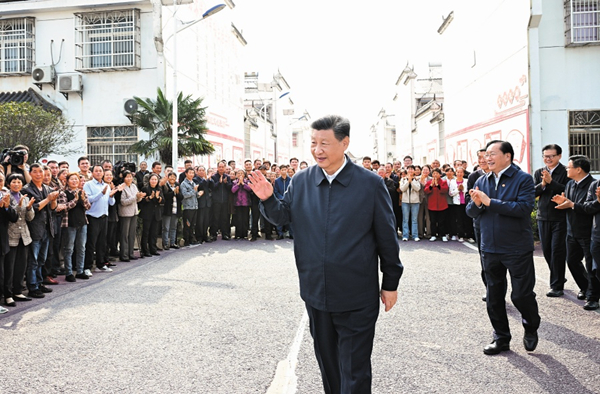Xi urges Hubei to drive modernization

Promoting cultural relics, innovation, ecology stressed

President Xi Jinping interacts with residents of Siyi village in Xianning on Tuesday during an inspection tour to Central China's Hubei province. Xi inspected the cities of Xiaogan, Xianning and Wuhan in Hubei from Monday to Wednesday. XIE HUANCHI/XINHUA
President Xi Jinping has highlighted the pivotal role of Central China's Hubei province in the nation's modernization drive, calling for greater strides in sci-tech and industrial innovation, ecological conservation and deepening comprehensive reform and opening-up.
Speaking during a fact-finding trip to the province from Monday to Wednesday, Xi stressed the need for the region to forge ahead in the high-quality development of the Yangtze River Economic Belt, and to build itself into a strategic fulcrum for the rise of the central region at an early date.
The trip took Xi, who is also general secretary of the Communist Party of China Central Committee and chairman of the Central Military Commission, to the cities of Xiaogan, Xianning and Wuhan, the provincial capital.
Hubei, with a GDP of 5.58 trillion yuan ($777.46 billion) and a population of 58.38 million in 2023, is not just an economic powerhouse but also a region deeply integrated into China's broader economic architecture. It was Xi's second trip to the province in three years.
During the trip, the president toured a museum that exhibits ancient bamboo and wooden slips dating back to the Qin Dynasty (221-206 BC) and the Han Dynasty (206 BC-AD 220), and he called for unrelenting efforts in archaeological research and the protection of cultural relics.
In Jiayu county, he set foot in a field, surveying the growth of vegetables before shaking hands with a farmer. The development of modern agriculture and building a strong agricultural sector must be underpinned by sci-tech progress, Xi stressed.
The president also visited a village to learn about efforts to ensure that grassroots officials can better perform their duties in serving the people, before sitting down with a family to learn about their jobs, family income, healthcare and pensions.
In Wuhan, Xi toured the Wuhan Institute of Industrial Innovation and Development, where he reiterated the need for greater self-reliance in science and technology and the development of new quality productive forces.
On Wednesday morning, he listened to work reports from provincial authorities and set out clear requirements for their future tasks.
Noting the province's sharp edge in talent and strong capacity in sci-tech innovation, Xi called for stronger steps in sci-tech and industrial innovation. The province must proactively integrate itself into national innovation chains, striving to build a nationally influential hub for tech innovation, and better harness its role as a source of sci-tech breakthroughs, he said.
He called for enhanced steps in pushing for breakthroughs in the research and development of key technologies, saying that a coordinated innovation mechanism among large, medium-sized and small enterprises must be established.
Hubei, located in the middle reaches of the Yangtze River, must give top priority to the restoration of the ecology and environment of China's longest river, Xi said, and must also stress the development of a secure and resilient modern water network and the unwavering enforcement of the river's 10-year fishing ban, enacted in 2021.
Xi said it is necessary for the province to forge ahead in deepening reform and expanding high-level opening-up, and he called for reforms in key sectors and critical areas, better integration into the unified national market, and the building of a more equitable and dynamic market environment.
It is important to give equal emphasis to domestic and global opening-up, make the province an inland engine for opening-up and advance regional cooperation, he added.
The president encouraged Hubei to play an active part in the high-quality building of the Belt and Road and make systematic efforts to bolster its role as a hub for opening-up.
Xi also stressed the significance of ratcheting up efforts in rural-urban integration and rural vitalization in the province, which boasts a rural population of 20.16 million and which had an urbanization rate of 65.47 percent last year.
It is imperative that the province advance the protection, preservation and development of its rich historical and cultural heritage, while strengthening research and promotion of the origins of the Yangtze River civilization, he added.
The president also extended a message calling for heightened and more concrete efforts in work on all fronts, especially the economy, with greater urgency to meet the nation's socioeconomic development goals this year.
xuwei@chinadaily.com.cn







